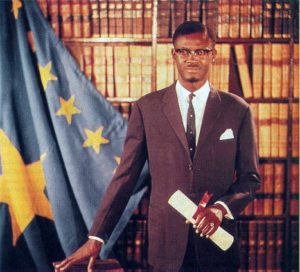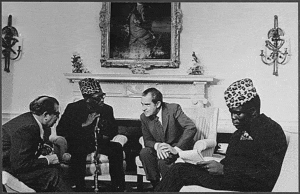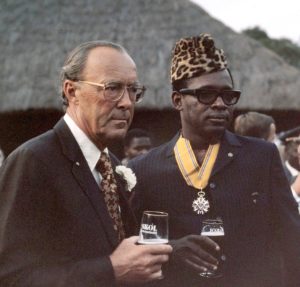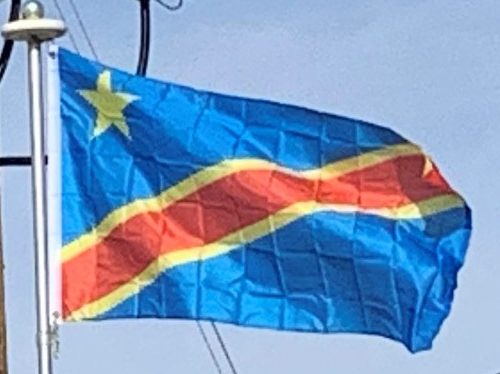
Lumumba had previously appointed Joseph Mobutu chief of staff of the new Congo army, Armée Nationale Congolaise (ANC). Taking advantage of the leadership crisis between Kasavubu and Tshombe, Mobutu garnered enough support within the army to launch a coup. With financial support from the United States and Belgium, Mobutu paid his soldiers privately. The aversion of Western powers to communism and leftist ideology influenced their decision to finance Mobutu’s quest to neutralize Kasavubu and Lumumba in a coup by proxy. A constitutional referendum the year before Mobutu’s coup of 1965 resulted in the country’s official name being changed to the “Democratic Republic of the Congo.” In 1971 Mobutu changed the name again, this time to “Republic of Zaire”.
Mobutu and Zaire (1965–97):
The new president had the staunch support of the United States because of his opposition to Communism; the US believed that his administration would serve as an effective counter to communist movements in Africa. A single-party system was established, and Mobutu declared himself head of state. He periodically held elections in which he was the only candidate. Although relative peace and stability were achieved, Mobutu’s government was guilty of severe human rights violations, political repression, a cult of personality and corruption.

By late 1967 Mobutu had successfully neutralized his political opponents and rivals, either through co-opting them into his regime, arresting them, or rendering them otherwise politically impotent. Throughout the late 1960s Mobutu continued to shuffle his governments and cycle officials in and out of office to maintain control. Kasa-Vubu’s death in April 1969 ensured that no person with First Republic credentials could challenge his rule. By the early 1970s Mobutu was attempting to assert Zaire as a leading African nation. He traveled frequently across the continent while the government became more vocal about African issues, particularly those relating to the southern region. Zaire established semi-clientelist relationships with several smaller African states, especially Burundi, Chad, and Togo.
Corruption became so common the term “le mal Zairois” or “Zairian Sickness”, meaning gross corruption, theft and mismanagement, was coined, reportedly by Mobutu himself. International aid, most often in the form of loans, enriched Mobutu while he allowed national infrastructure such as roads to deteriorate to as little as one-quarter of what had existed in 1960. Zaire became a kleptocracy as Mobutu and his associates embezzled government funds.
In a campaign to identify himself with African nationalism, starting on 1 June 1966, Mobutu renamed the nation’s cities: Léopoldville became Kinshasa (the country was now Congo-Kinshasa), Stanleyville became Kisangani, Elisabethville became Lubumbashi, and Coquilhatville became Mbandaka. This renaming campaign was completed in the 1970s.
In 1971, Mobutu renamed the country the Republic of Zaire, its fourth name change in eleven years and its sixth overall. The Congo River was renamed the Zaire River.

During the 1970s and 1980s, he was invited to visit the United States on several occasions, meeting with U.S. Presidents Richard Nixon, Ronald Reagan and George H. W. Bush. Following the dissolution of the Soviet Union U.S. relations with Mobutu cooled, as he was no longer deemed necessary as a Cold War ally. Opponents within Zaire stepped up demands for reform. This atmosphere contributed to Mobutu’s declaring the Third Republic in 1990, whose constitution was supposed to pave the way for democratic reform. The reforms turned out to be largely cosmetic. Mobutu continued in power until armed forces forced him to flee in 1997. “From 1990 to 1993, the United States facilitated Mobutu’s attempts to hijack political change”, one academic wrote, and “also assisted the rebellion of Laurent-Desire Kabila that overthrew the Mobutu regime.”
Continental and Civil Wars (1996–present):
By 1996, following the Rwandan Civil War and genocide and the ascension of a Tutsi-led government in Rwanda, Rwandan Hutu militia forces (Interahamwe) fled to eastern Zaire and used refugee camps as a base for incursions against Rwanda. They allied with the Zairian Armed Forces (FAZ) to launch a campaign against Congolese ethnic Tutsis in eastern Zaire.
